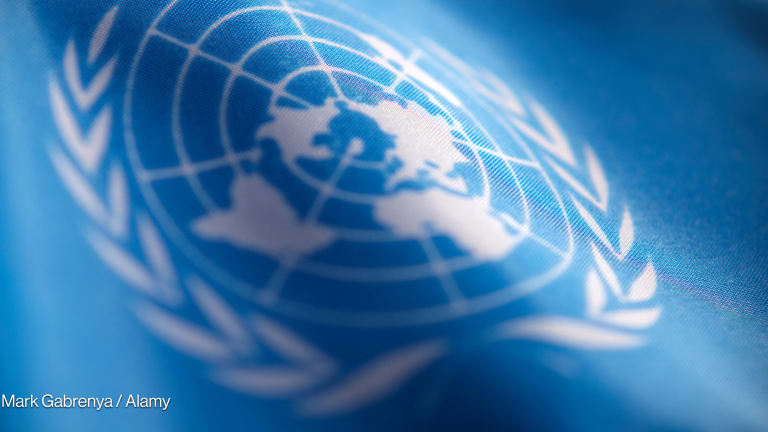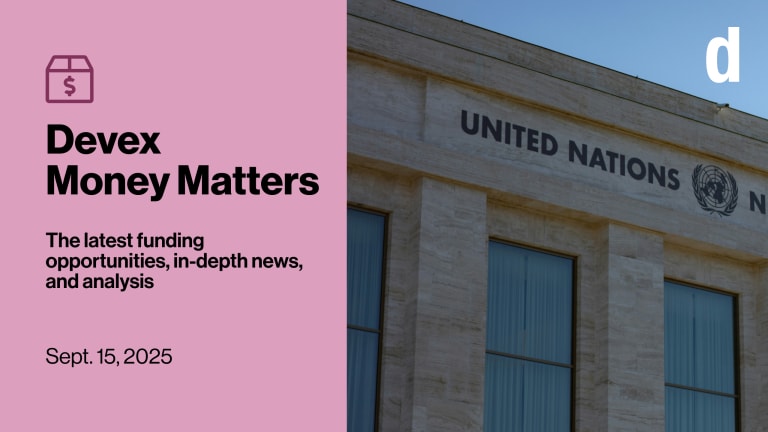
NEW YORK — The United Nations Joint SDG Fund recently announced that recipients can repurpose up to 20% of their development funding for COVID-19 responses.
The pandemic has stalled some development programming, but it has also highlighted areas of potential impact, such as better health care data analytics. And, increasingly, development organizations are signaling that they would like to pivot their work to COVID-19 response — if available funding is flexible.
“We heard from a handful of recipients that this is an issue, and what we wanted everyone to know is that this is an option for them,” said Lisa Kurbiel, head of the Joint SDG Fund, which supports joint U.N. agency programs and is housed within the U.N. Development Coordination Office.
We’ve lifted our paywall on all COVID-19 articles. Looking for more in-depth global development coverage? Please consider supporting our journalism with a Pro subscription.
COVID-19 funding will likely impact the long-term financing prospects of the Sustainable Development Goals, experts say. For now, U.N. development funds are relaxing restrictions so agencies can accommodate the necessary reality of joining COVID-19 with SDG work.
“The challenge always is there's core business that needs to get done, but often there's something that could help you leap frog ahead. Identifying a gap and saying if only we could meet this one gap, we could maybe unlock resources for something else — at a time like COVID-19, I think that is really quite strategic,” Kurbiel continued.
The Joint SDG Fund has $100 million in available funding for 2020. Struggling middle and upper-middle-income countries not funded by the Office for the Coordination of Humanitarian Affairs are in particular need of support, Kurbiel said.
U.N. chief António Guterres and other U.N. officials have repeatedly asked donors to support the COVID-19 global humanitarian response fund with new money, and to not draw from money intended for the SDGs.
“We are not asking you to prioritize between funds — our health response, humanitarian appeal and socioeconomic action are mutually reinforcing. We need to charge ahead on all these fronts,” U.N. Deputy Secretary-General Amina Mohammed recently said.
Governments have given more than $756 million to the U.N. COVID-19 fund, which aims to raise $2 billion. Meanwhile, there is a $2.5 trillion annual funding gap that needs to close if countries want to meet the SDGs by their 2030 deadline.
“I have been asked this question many times if we will push the goals back to 2035 or 2040, but as of now ... the answer is no.”
— Navid Hanif, director, U.N. Financing for Sustainable Development OfficeIt is too soon to track how emergency COVID funding — and longer-term recovery work — could influence SDG funding goals, U.N. funding experts say. A form of “contact tracing of aid flows” will be necessary over the next several months to monitor new COVID funding and development work, according to Jennifer Topping, executive director at the U.N. Multi-Partner Trust Fund Office.
“It's pretty hard to see how much of the response to the COVID appeals is new appropriations and how much is coming from somewhere else. It could be that it's repurposed from something else, but not necessarily from another humanitarian crisis. It could be money that had been forward-programmed for something that is just moved further down the track,” Topping said.
“It just takes time to trace to kind of see the reporting, because you have to have data that looks inside the country's budget appropriations, in that real time,” Topping continued.
The SDG Fund is just one mechanism that is thinking about funding outside of traditional SDG and development terms, Topping explained. Topping said she has also seen “quite a bit of targeting and repurposing of funding” toward COVID within the U.N. Peacebuilding Fund and the U.N. Start-up Fund for Safe, Orderly and Regular Migration.
“They are all going through a similar exercise of making sure that they're targeted on the right sort of things for the crisis,” Topping said.
U.N. peacebuilding work has experienced delays in the last few months, with training sessions, workshops, sessions, and expert visits postponed, according to Marc-André Franche, chief of financing for the U.N. Peacebuilding Fund. But staffers have also altered plans to fit the pandemic’s reality from Central Asia to Latin America. In Colombia, one recipient peacebuilding organization recently shifted to a new public health response project that involves civil society and activists, Franche explained.
“There are adjustments that have also been positive,” Franche said.
COVID-19 emergency responses are challenging humanitarian organizations like the World Food Programme that have seen a sudden increase in anticipated needs and are already facing money problems. So far, development mechanisms like the Peacebuilding Fund have not experienced budgetary constraints as a result of the crisis, Franche said.
More in-depth for Pro subscribers: Aid levels inch upward but COVID-19 looms
Official development assistance increased slightly last year, according to initial data from OECD. But with many donors in "domestic meltdown," next year looks uncertain.
That trend could change, though, as the pandemic continues and threatens more stable sources of financing, like official development assistance.
“In societies that are already divided, where the systems are already weak, this pandemic is going to open up those grievances, and we might look at a greater threat of violence and tension,” Franche said. “Funding that we would have normally had access to could be diverted to emergency COVID.”
Growing financial challenges, high debt risks, and increasing trade restrictions as a result of COVID-19 could all destabilize development progress and funding, according to the “U.N. Financing for Sustainable Development 2020” report, issued in early April. ODA, which fell by 4.3% in 2018, could continue to decline as unemployment rises and tax bases erode, the report showed.
“If you put these things together, the debt burden will increase and these countries will not have space to spend on the SDGs,” said Navid Hanif, director of the U.N.’s Financing for Sustainable Development Office.
Hanif said that, when possible, COVID responses should reflect the principles of the SDGs — especially the idea of leaving no behind. He expects that the pandemic could influence which SDGs are prioritized, but there is no indication that the crisis will derail standard flows of development funding.
“Some prioritizing will happen. Health systems will become a priority, social protection will become another one,” Hanif said. “I have been asked this question many times if we will push the goals back to 2035 or 2040, but as of now there is no such indication from many member states that this will happen and the answer is no.”
Visit our dedicated COVID-19 page for news, job opportunities, and funding insights.









